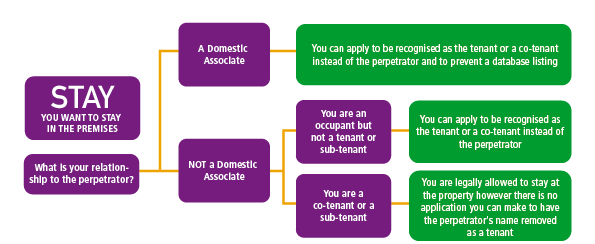
This factsheet explains the process under the Residential Tenancies and Rooming Accommodation Act 2008 (Qld) (the Act) if you want to stay in the rental premises where you have experienced domestic and family violence (DFV) by a domestic associate or someone else living in the property. A ‘domestic associate’ is any person who is in a spousal or intimate partner relationship, family relationship or informal care relationship.
You have options to STAY and have the tenancy/residency transferred into your name.

I want to STAY in the property
If you are a tenant and also a domestic associate who has experienced DFV, you may want to stay in the property. If you feel safe and know that you can fulfill the obligations of a tenant – to pay the rent and look after the premises, you can take steps to stay in the premises.
Can I change the locks?
As a tenant you may change the locks without getting the agreement of the lessor/agent if it’s necessary to protect yourself or an occupant from DFV. You must engage a locksmith or other qualified tradesperson to change the lock and give the lessor/agent a copy of the key for the changed lock.
If there are body corporate by-laws about keys, such as in unit complexes, you need to comply with these by-laws. Check the by-laws which should have been provided with your tenancy agreement when you moved in.
As a rooming resident, you can request that the rooming provider change or repair a lock to protect you from DFV. The provider must change the lock.
The lessor/agent/ provider must not give a key for the new lock to anyone else without your agreement. Penalties apply if the lessor/agent/ provider breaches this.
How do I deal with damage?
When you are a tenant/resident who has experienced DFV, you are not responsible for repairing the damage or compensating the lessor/provider for damage caused to the property by an act of DFV.
Collecting evidence at the time of the DFV is important, including:
- police reports (keep a record of the police report number)
- any documentation relating to DFV – Police Protection Notice, Temporary Protection Order, Domestic Violence Protection Order
- photographs
- witness statements
- DFV case worker statements
You can give your lessor/provider details of the damage and copies of the evidence to show that the damage was caused by DFV and state that it is not your responsibility.
You do not need to inform the lessor/provider about damage caused by domestic violence that you have experienced at the time it happens. However, the evidence you collect at the time will assist, if the lessor seeks compensation for the damages.
I am a domestic associate and want to stay in a rental property
You may apply to the Queensland Civil and Administrative Tribunal (QCAT) for an order recognising you as a tenant or co-tenant instead of your domestic associate because of domestic violence committed against you.
Tribunal proceedings
When deciding an application for a domestic associate to stay, the Tribunal must take into account the following: whether you have applied for a protection order if an application for a protection order was made, whether an order was made or is still in force if a protection order was made whether a condition of the order prohibits your domestic associate from entering or remaining on the premises, and anything else the Tribunal considers relevant.
If you do not have a protection order, you can provide the Tribunal with relevant evidence of DFV, such as a letter or affidavit from a support worker or health practitioner.
The Tribunal must allow the lessor/agent/provider an opportunity to be heard, so you must name them as a respondent on your application. The lessor/agent/provider will want to ensure that the person proposing to stay in the rental property can afford to pay the rent and fulfill the obligations of a tenant/resident. Provide evidence that shows that you can afford the rent such as proof of employment and or income.
You can also request that the Tribunal make orders about the bond or to prevent a tenancy database listing.
I am an occupant and I want to stay
The Act also applies if you occupy the premises but are not named as a tenant on the tenancy agreement.
Where a tenant or co-tenant has or is likely to intentionally or recklessly cause:
- serious damage to the premises or
- injury to you or someone else occupying, or allowed, on the premises.
You can make an application to the Tribunal for an order to be recognised as a tenant or co-tenant, instead of the tenant or co-tenant who perpetrated the violence.
For this application the tenancy Tribunal must give the lessor/agent/provider an opportunity to be heard so you must name them as a respondent on your application. Provide evidence that shows that you can afford the rent such as proof of employment and or income.
Can I install security features?
You can attach fixtures or make structural changes to the premises if you have a written agreement with your lessor/agent/provider. You do not need the lessor/agent/provider’s approval if the security device can be easily removed and is not attached to the premises.
If you attach a fixture without the lessor/provider’s agreement, the lessor/provider can treat it as an improvement to the property and not consider that it is a breach or take action to seek compensation for removing the fixture.